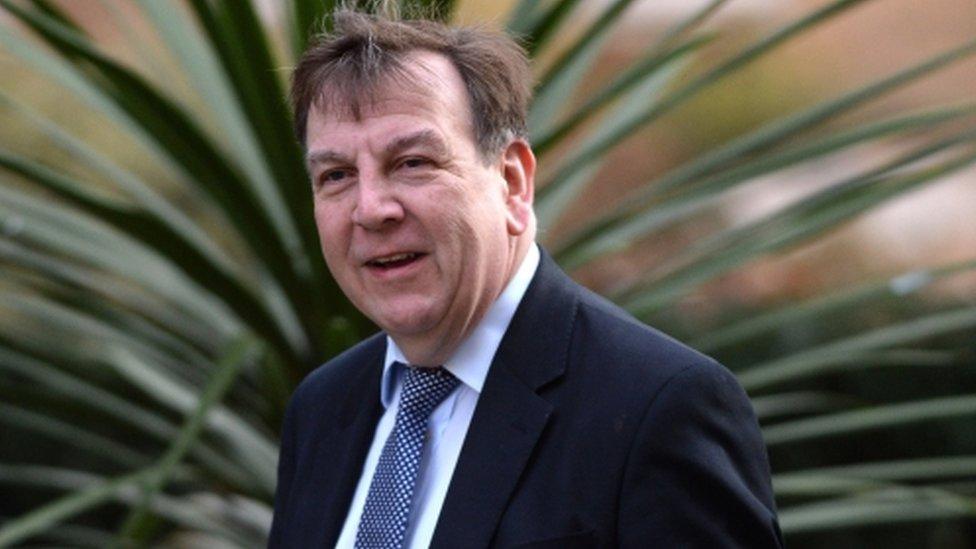John Whittingdale row: Who is he and why does the story matter?
- Published
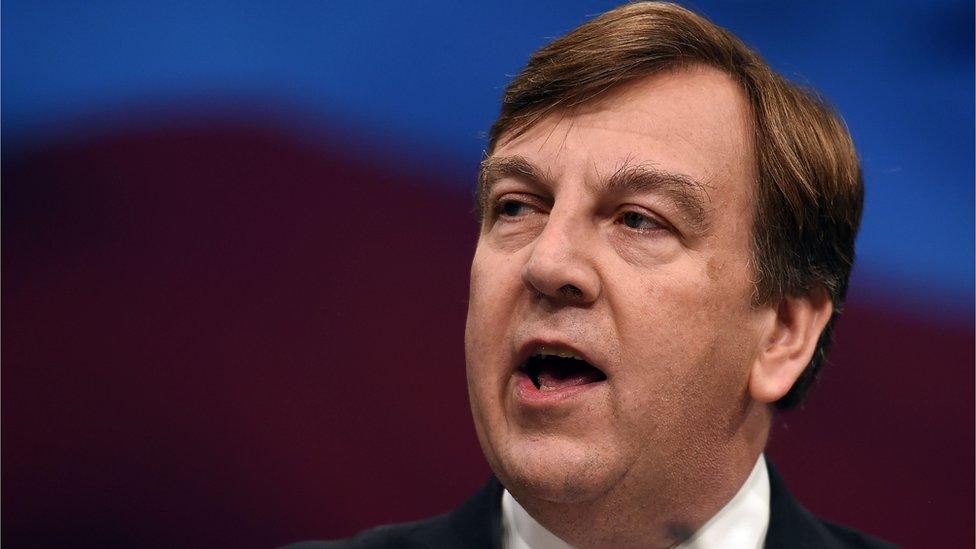
A guide to the row involving Fleet Street, press reform campaigners and the Labour Party over revelations about Culture Secretary John Whittingdale's relationship with an escort.

Who is John Whittingdale?
He is currently the secretary of state for culture, media and sport.
The Conservative MP for Maldon and East Chelmsford, 56, was previously chairman of the influential Commons Culture, Media and Sport Committee for 10 years.
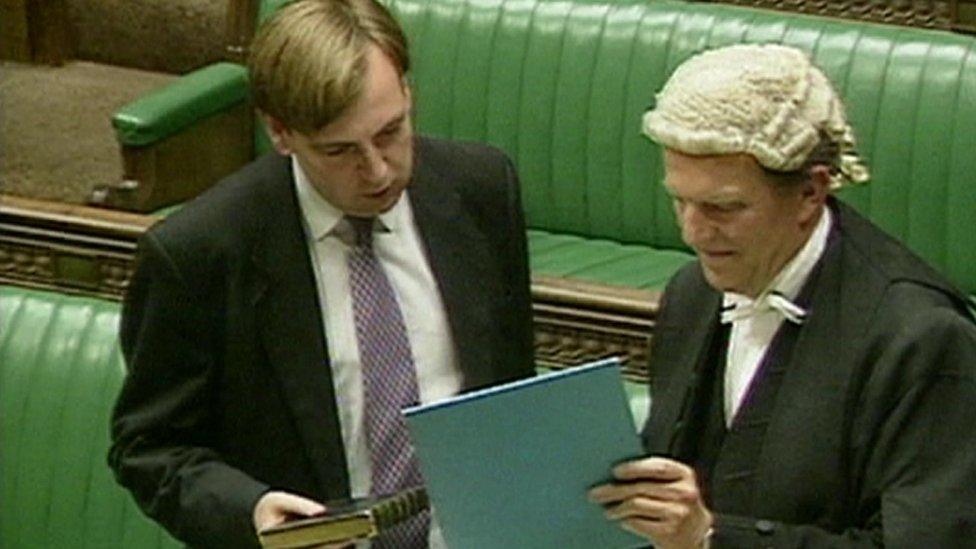
John Whittingdale has been an MP since 1992
Before becoming an MP in 1992 he was political secretary to former prime minister Margaret Thatcher.

What has happened?
Mr Whittingdale had a relationship with a woman he met on an online dating website who turned out to be an escort.
He says he had no idea she was a sex worker and ended the relationship when he found out in 2014 - before he was made a government minister with responsibility for press regulation.
Four newspapers knew about the relationship but decided not to publish the story.

Why was it not published?
The newspapers involved, and many of the media pundits who have had their say so far, say there was simply no public interest in publishing a story about the love life of a single man who was not a government minister.
But campaign group Hacked Off points to Mr Whittingdale's remit, which includes press regulation, saying the papers have questions to answer about why the story never saw the light of day.

What questions does it raise?
Hacked Off - and the Labour Party - say the unpublished story presented a potential conflict of interest for Mr Whittingdale, in particular concerning his decisions on how tightly the press should be controlled. His position has been compromised, they say.
Labour's Chris Bryant, who was previously shadow culture secretary, says it "seems the press were quite deliberately holding a sword of Damocles over John Whittingdale".
Why Culture Secretary John Whittingdale is under pressure - Newsnight report
Mr Whittingdale did not inform Downing Street about the story when he was made culture secretary, and No 10 confirmed it was not aware of the relationship.
BBC political editor Laura Kuenssberg said the question for him was not about the relationship, but about his role in regulating the press when the newspapers had a story about his private life.
Mr Whittingdale denies his decision-making was affected.

The Leveson connection
The backdrop to the row is the Leveson Inquiry into press standards, established in the wake of the phone-hacking scandal which led to the closure of the News of the World in 2011 after revelations journalists illegally accessed people's phones for stories.
Published in 2012, the inquiry made a number of recommendations and many newspapers were strongly opposed to key parts.
Newspapers have set up their own regulator, the Independent Press Standards Organisation, but Hacked Off says important parts of Lord Leveson's report have not been implemented.
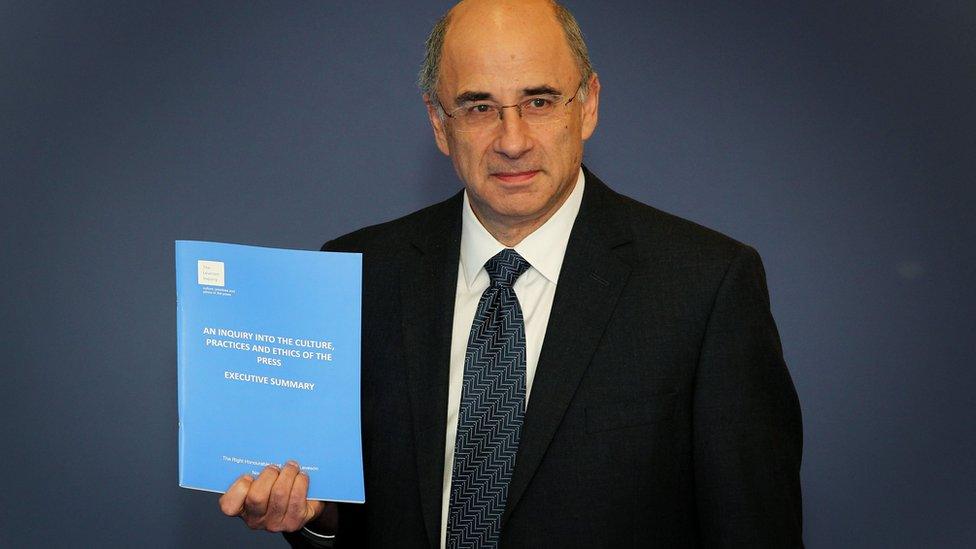
The first part of Lord Justice Leveson's report was published in 2012
In particular, one of the regulations would require newspapers to pay libel costs even if they won a case brought against them, should they not have previously offered a low-cost means of resolving the claim.
This rule - section 40 of the Crime and Courts Act 2013, external has been passed by Parliament but needs to be signed off by Mr Whittingdale.
He says it is "under consideration", but Labour's Maria Eagle says Mr Whittingdale must "clarify exactly why he no longer believes" section 40 should come into force.
There is also due to be a second part of the inquiry, looking at ties between newspapers and the police, which could not take place until criminal cases had been completed.
There have been reports this inquiry has been shelved, but the government says it has not yet decided whether to pursue it.
A Downing Street spokesman said: "We've always said that criminal investigations and legal processes relating to Leveson need to have fully concluded before we consider part two."

What has Labour said?
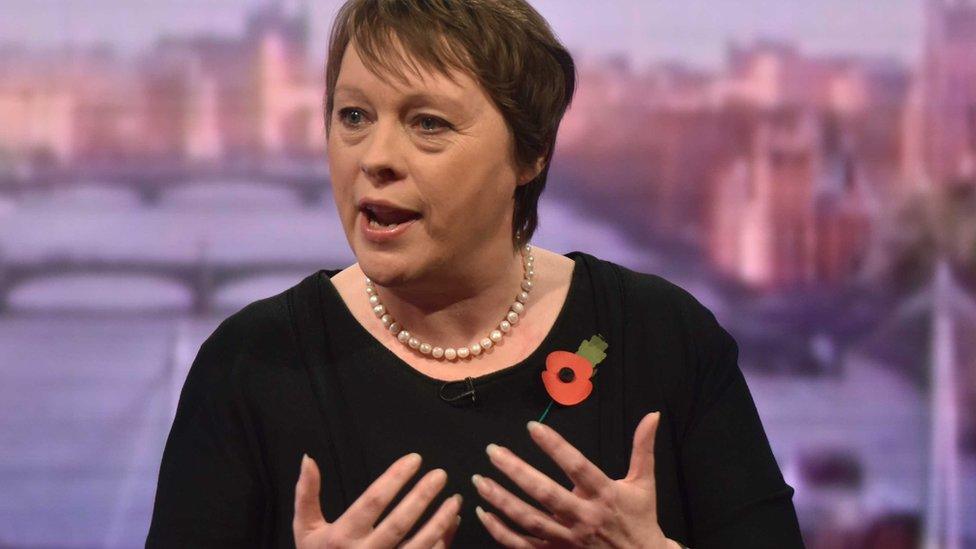
Labour's Maria Eagle said Mr Whittingdale should not take decisions on press regulation
The opposition has called on Mr Whittingdale to withdraw from decisions on press regulation.
His opposite number, Maria Eagle, said he had "reneged" on a cross-party agreement to implement Leveson having previously supported it when select committee chairman.
She said he should "recuse himself" from decisions on the subject "in order for the public to have any confidence in the government's approach to press regulation".
Downing Street sources say it would be ludicrous for Mr Whittingdale to be vulnerable because of a decision by newspapers not to publish a story about him.
The BBC's Laura Kuenssberg said there was no sense Labour would get its demand, adding that it was important to note Mr Whittingdale as a political character would always have be expected to favour "light touch" regulation of the press.

What has Mr Whittingdale said?
John Whittingdale declined to give any further comment on his past relationship with an escort
The culture secretary put out a statement saying the "old story" about his relationship had been "a bit embarrassing at the time".
He added: "The events occurred long before I took up my present position and it has never had any influence on the decisions I have made as culture secretary."
Downing Street said he was "a single man entitled to a private life" and had the full confidence of the prime minister.

Was there a public interest argument in publishing the story?
Should the story have been published in any case? On the Today programme, Hacked Off's Evan Harris said there were public interest arguments in favour of publication, including the fact that Mr Whittingdale had "lectured" former F1 boss Max Mosley, who had been the subject of a tabloid expose, during a committee hearing. He also said "these sorts of stories" are often run with no public interest justification.
Former News of the World deputy editor Neil Wallis said such a story may have been published in the pre-Leveson era, but said under the new regime it had been judged not to merit publication.
Media pundit Steve Hewlett said the newspapers had in fact behaved "entirely in keeping with the way that the privacy campaigners wanted them to behave in any other circumstances".
Some have accused Hacked Off themselves of hypocrisy for calling for publication of a story about Mr Whittingdale's private life having long campaigned against press intrusion.

What next?
While Mr Whittingdale does not look like losing his responsibility for press regulation as Labour demand, Laura Kuenssberg said a reshuffle was expected in the aftermath of the EU referendum.
She added: "This is certainly the kind of headache that the government could do without, and it's the kind of story, involving politicians, the papers, and sex, that could well take an unpredictable turn."

- Published13 April 2016
